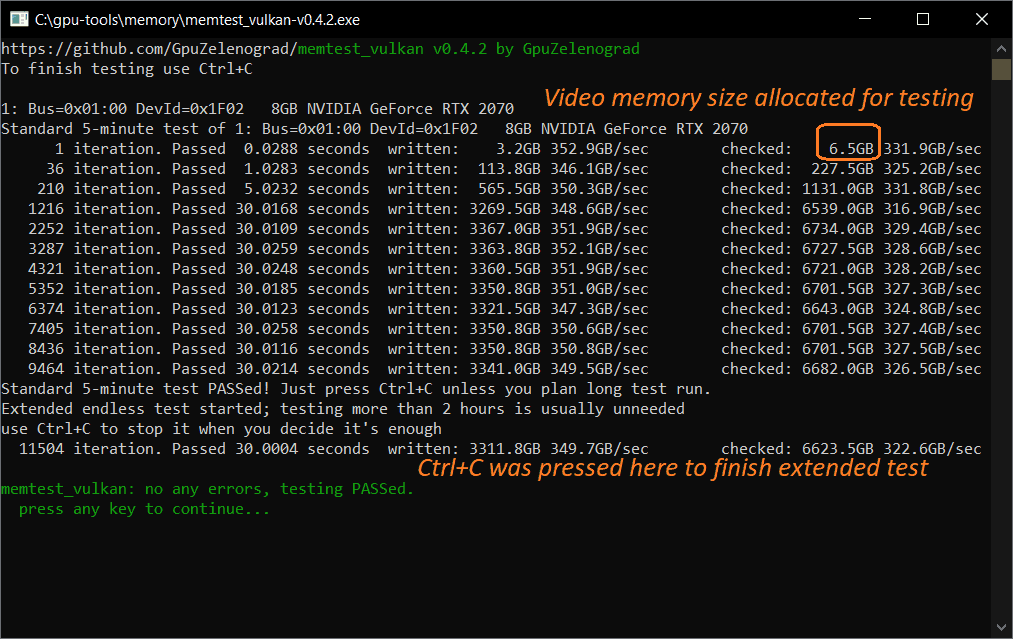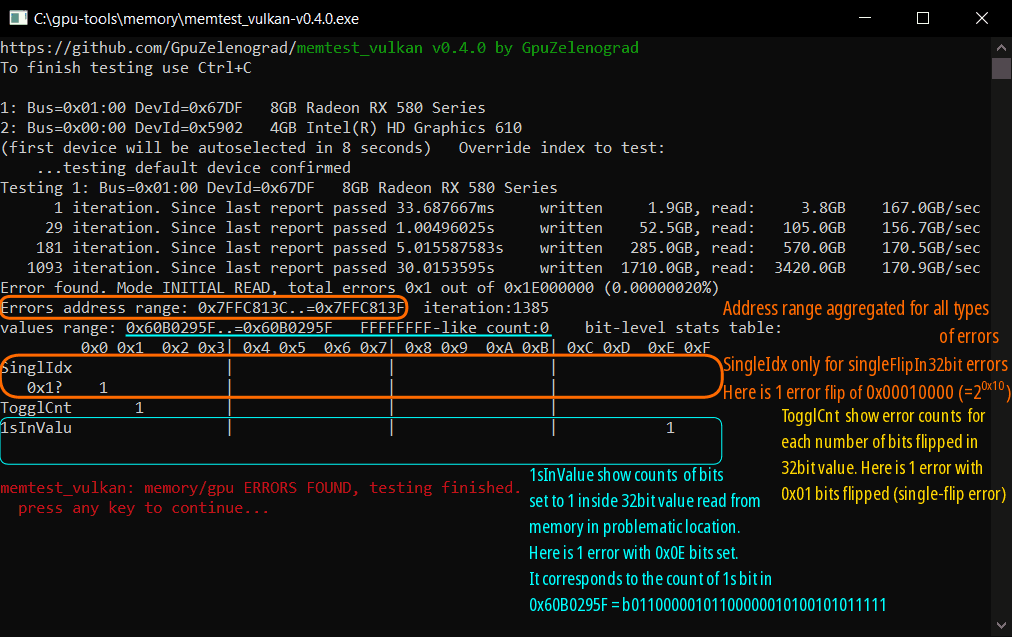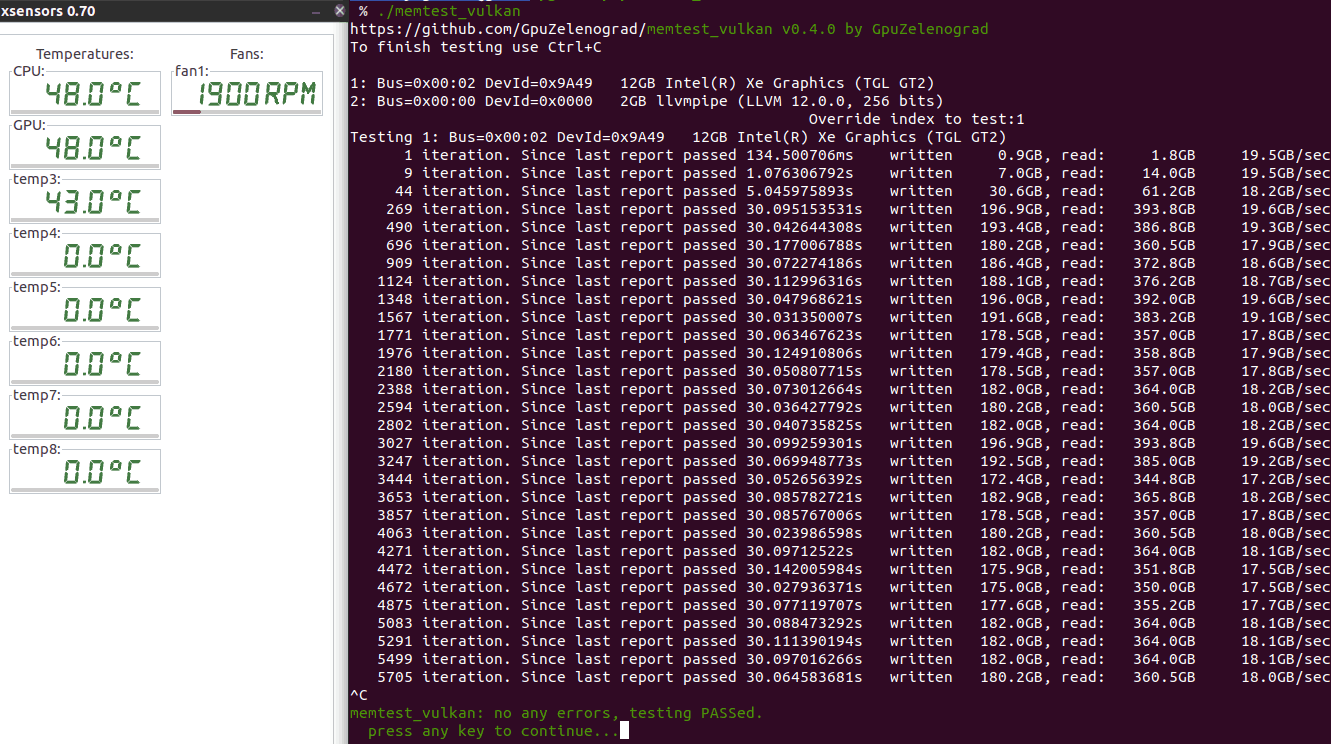memtest_vulkan - GPU memory testing tool
Opensource cross-platform tool written in vulkan compute to stress test video memory for stability during overclocking or repair.
Just start application, wait at least 6 minutes and stop testing by Ctrl+C. Detected errors are displayed immediately during test run.
Requires system-provided vulkan loader and driver supporting Vulkan 1.1 (already installed with graphics drivers on most OS).
⬇Get 64-bit .exe from latest release. GitHub users also may want to try CI build artifacts (only last 3 months kept).
Start test by double-clicking the utility, no installation / parameters / configuration / admin-rights required.

Any found errors are immediately reported with a multi-line details. Detailed descriptions given below may help in advanced cases, but most of the time it's enough just check if errors are absent or present

Alternatively, the tool can be started from cmdline
C:\gpu-tools\memory>memtest_vulkan.exe https://github.com/GpuZelenograd/memtest_vulkan v0.3.0 by GpuZelenograd To finish testing use Ctrl+C1: Bus=0x00:00 DevId=0x9A49 8GB Intel(R) Iris(R) Xe Graphics Testing 1: Bus=0x00:00 DevId=0x9A49 8GB Intel(R) Iris(R) Xe Graphics 1 iteration. Since last report passed 271.3561ms written 1.8GB, read: 3.5GB 19.3GB/sec 5 iteration. Since last report passed 1.0910091s written 7.0GB, read: 14.0GB 19.2GB/sec 42 iteration. Since last report passed 10.2049349s written 64.8GB, read: 129.5GB 19.0GB/sec 409 iteration. Since last report passed 100.2136744s written 642.2GB, read: 1284.5GB 19.2GB/sec 791 iteration. Since last report passed 100.0165577s written 668.5GB, read: 1337.0GB 20.1GB/sec 1173 iteration. Since last report passed 100.1249672s written 668.5GB, read: 1337.0GB 20.0GB/sec 1551 iteration. Since last report passed 100.0042873s written 661.5GB, read: 1323.0GB 19.8GB/sec (Ctrl-C pressed) memtest_vulkan: no any errors, testing PASSed. press any key to continue...
Install by unpacking archives with linux prebuilt binaries for X86_64 (Desktop) or AARCH64 (Embedded) from
Releases or artifacts (github account required). Build artifacts are transparently produced from source by github actions, but only last 3 months kept.
Use by opening a terminal in a folder with extracted file and explicitly running ./memtest_vulkan. Do NOT just double-click binary in GUI (it would lead to starting test in the background without ability to stop it - issue)
Linux platform often contains additional llvmpipe pure-CPU vulkan driver. So after the start device selection menu will be shown. You can wait 10 seconds for automatic device selection or manually type the device number to test

With multiple drivers packages installed running under linux may require explicitly setting environment variables
The details & reasons about the variables are discussed in [troubleshooting section](#troubleshooting), here are only execution examples[user@host ~]$ VK_DRIVER_FILES=/usr/share/vulkan/icd.d/nvidia_icd.json ./memtest_vulkan https://github.com/GpuZelenograd/memtest_vulkan v0.3.0 by GpuZelenograd To finish testing use Ctrl+C1: Bus=0x01:00 DevId=0x2204 24GB NVIDIA GeForce RTX 3090 Testing 1: Bus=0x01:00 DevId=0x2204 24GB NVIDIA GeForce RTX 3090 1 iteration. Since last report passed 56.112854ms written 19.5GB, read: 22.8GB 752.9GB/sec 19 iteration. Since last report passed 1.011701765s written 351.0GB, read: 409.5GB 751.7GB/sec 199 iteration. Since last report passed 10.050222094s written 3510.0GB, read: 4095.0GB 756.7GB/sec 1954 iteration. Since last report passed 100.004113065s written 34222.5GB, read: 39926.2GB 741.5GB/sec ^C memtest_vulkan: no any errors, testing PASSed. press any key to continue...
Example run with a single-wire/singe-bit error
[user@host ~]$ ./memtest_vulkan
https://github.com/GpuZelenograd/memtest_vulkan v0.3.0 by GpuZelenograd
To finish testing use Ctrl+C
1: Bus=0x01:00 DevId=0x1B87 8GB NVIDIA P104-100
Testing 1: Bus=0x01:00 DevId=0x1B87 8GB NVIDIA P104-100
1 iteration. Since last report passed 52.20479ms written 3.8GB, read: 7.5GB 215.5GB/sec
21 iteration. Since last report passed 1.0515038s written 75.0GB, read: 150.0GB 214.0GB/sec
216 iteration. Since last report passed 10.021230569s written 731.2GB, read: 1462.5GB 218.9GB/sec
2125 iteration. Since last report passed 100.010942973s written 7158.8GB, read: 14317.5GB 214.7GB/sec
Error found. Mode NEXT_RE_READ, total errors 0x3C7EC3 out of 0x3C000000 (0.39384872%)
Errors address range: 0x9D66148C..=0xDCD3036B deatils:
0x0 0x1 0x2 0x3| 0x4 0x5 0x6 0x7| 0x8 0x9 0xA 0xB| 0xC 0xD 0xE 0xF
Err1BIdx | 1m | |
0x1? | 1m | |
ErrBiCnt 3m 820k | | |
MemBiCnt 1 2| 32 249 13645067| 15k 39k 81k142k|219k308k 398k468k
0x1? 506k502k 448k353k|239k134k 63k 25k|79792113 310 43| 5 1
actual_ff: 0 actual_max: 0xFFFFFFB7 actual_min: 0x00000730 done_iter_or_err:4294967295 iter:1 calc_param 0x00100107
Error found. Mode INITIAL_READ, total errors 0x7E0C6E out of 0x3C000000 (0.82062860%)
Errors address range: 0x11640B6C4..=0x1DFFFEFFF deatils:
0x0 0x1 0x2 0x3| 0x4 0x5 0x6 0x7| 0x8 0x9 0xA 0xB| 0xC 0xD 0xE 0xF
Err1BIdx | 3m | |
0x1? | 3m | |
ErrBiCnt 6m 1m | | 51 3 598| 302573 824924
0x1? 1084402 772471| 22 878 7 152| 1 4 1 |
MemBiCnt 7| 43 285 15296317| 19k 50k 107k200k|326k483k 653k817k
0x1? 949k 1m 999k886k|704k493k 297k149k| 62k 20k 57931263| 185 21 1
actual_ff: 0 actual_max: 0xFFFFFF46 actual_min: 0x000000B0 done_iter_or_err:4294967295 iter:2160 calc_param 0x8708AB91
Runtime error: ERROR_DEVICE_LOST while getting () in context wait_for_fences
...hangs in-kernel due to driver
64-bit ARM platforms are supported by AARCH64 binary.
Example run on NVIDIA Jetson
jetson-nx-alpha :: ~ » ./memtest_vulkan
https://github.com/GpuZelenograd/memtest_vulkan v0.3.0 by GpuZelenograd
To finish testing use Ctrl+C
1: Bus=0x00:00 DevId=0xA5BA03D7 8GB NVIDIA Tegra Xavier (nvgpu)
Testing 1: Bus=0x00:00 DevId=0xA5BA03D7 8GB NVIDIA Tegra Xavier (nvgpu)
1 iteration. Since last report passed 163.678336ms written 2.4GB, read: 4.8GB 43.5GB/sec
7 iteration. Since last report passed 1.045756448s written 14.2GB, read: 28.5GB 40.9GB/sec
61 iteration. Since last report passed 10.06722992s written 128.2GB, read: 256.5GB 38.2GB/sec
593 iteration. Since last report passed 100.063183744s written 1263.5GB, read: 2527.0GB 37.9GB/sec
1121 iteration. Since last report passed 100.043447136s written 1254.0GB, read: 2508.0GB 37.6GB/sec
^C
memtest_vulkan: no any errors, testing PASSed.
press any key to continue...
Raspberry 4 with 64-bit Broadcom V3D vulkan driver is also supported, but the achieved performance is quite low. No GUI required, test can be started via SSH connection:
root@raspberrypi:/root# ./memtest_vulkan
https://github.com/GpuZelenograd/memtest_vulkan v0.4.2 by GpuZelenograd
To finish testing use Ctrl+C
1: Bus=0x00:00 DevId=0xBE485FD3 1GB V3D 4.2
2: Bus=0x00:00 DevId=0x0000 2GB llvmpipe (LLVM 14.0.6, 128 bits)
(first device will be autoselected in 0 seconds) Override index to test:
...first device autoselected
Standard 5-minute test of 1: Bus=0x00:00 DevId=0xBE485FD3 1GB V3D 4.2
1 iteration. Passed 1.8044 seconds written: 0.2GB 0.6GB/sec checked: 0.5GB 0.4GB/sec
2 iteration. Passed 1.8037 seconds written: 0.2GB 0.6GB/sec checked: 0.5GB 0.4GB/sec
5 iteration. Passed 5.4135 seconds written: 0.8GB 0.6GB/sec checked: 1.5GB 0.4GB/sec
22 iteration. Passed 30.6776 seconds written: 4.2GB 0.6GB/sec checked: 8.5GB 0.4GB/sec
39 iteration. Passed 30.6716 seconds written: 4.2GB 0.6GB/sec checked: 8.5GB 0.4GB/sec
56 iteration. Passed 30.6738 seconds written: 4.2GB 0.6GB/sec checked: 8.5GB 0.4GB/sec
73 iteration. Passed 30.6744 seconds written: 4.2GB 0.6GB/sec checked: 8.5GB 0.4GB/sec
90 iteration. Passed 30.6714 seconds written: 4.2GB 0.6GB/sec checked: 8.5GB 0.4GB/sec
107 iteration. Passed 30.6736 seconds written: 4.2GB 0.6GB/sec checked: 8.5GB 0.4GB/sec
124 iteration. Passed 30.6688 seconds written: 4.2GB 0.6GB/sec checked: 8.5GB 0.4GB/sec
141 iteration. Passed 30.6810 seconds written: 4.2GB 0.6GB/sec checked: 8.5GB 0.4GB/sec
158 iteration. Passed 30.6751 seconds written: 4.2GB 0.6GB/sec checked: 8.5GB 0.4GB/sec
Standard 5-minute test PASSed! Just press Ctrl+C unless you plan long test run.
Extended endless test started; testing more than 2 hours is usually unneeded
use Ctrl+C to stop it when you decide it's enough
192 iteration. Passed 30.6733 seconds written: 4.2GB 0.6GB/sec checked: 8.5GB 0.4GB/sec
^C
memtest_vulkan: no any errors, testing PASSed.
press any key to continue...
The only simple thing in result interpreting - is "If some errors are reported by memtest_vulkan - the PC has hardware problems". Most often GPU-related, but its hard to be sure if the problem is VRAM IC - related or GPU chip related.
You can create topic in discussions, sometimes the error log can be interpreted. Bust most of the time it is quite complex task, expand the theory section below
- The single-bit errors like in an image above. Such errors are counted in ToggleCnt column 0x01 and the exact bit indices are counted in SingleIdx column. Such errors may be detected by EDC in theory if they occur during transmitting by EDC-enabled part of GPU<->memory wire. But I'm not sure if EDC helps if they occure when transmitting between gpu cache and gpu core or something like this.
- The errors on data-inversion bit (if not detected by EDC). Those should be counted in ToggleCnt columns 0x07/0x08 without SingleIdx info for them.
- The multi-bit transmission errors. Those should be counted in ToggleCnt columns above 0x01, without SingleIdx info for them.
- The errors flipped in the memory chips itself during data storage/"refresh cycles". This may be caused by too big period of refresh or other problems. memtest_vulkan uses a part of memory in a "write once at start but reread every time" pattern - it is the reason fot read GB is more then written GB. If a data flips inside this part of memory - there would be infinite log of error messages marked with "Mode NEXT_RE_READ" (in opposite to Mode INITIAL_READ). Lowering the clocks without restarting test doesn't get rid of such errors.
- The errors on the address-transmission bus. The metest_vulkan is designed to perform reads to the non-sequential series of medium-sized sequential blocks. And if the address is wrongly interpreted by a memory chip - the result is completely garbage from wrong cell. Data-bus EDC can't help here. Those errors typically gives completely random error patterns with normal distribution of bits count and flipped bits (so typical number of flipped bits are 12-20 of 32 and getting 1 flipped bit for this case is extremely unrealistic). The result looks like
Error found. Mode INITIAL_READ, total errors 0x2B788 out of 0x18000000 (0.04422069%)
Errors address range: 0x6000E900..=0xBFDFF9FF iteration:38
values range: 0xFFFFA1A4..=0x0000166F FFFFFFFF-like count:0 bit-level stats table:
0x0 0x1 0x2 0x3| 0x4 0x5 0x6 0x7| 0x8 0x9 0xA 0xB| 0xC 0xD 0xE 0xF
SinglIdx | | |
TogglCnt 2| 7 18 95 264| 8451786 40056770| 11k 15k 20k 23k
0x1? 23k 21k 17k 12k|81944859 24701266| 486 248 62 29| 4 2
1sInValu 3| 19 66 223 700|17683704 6856 11k| 16k 21k 25k 26k
0x1? 23k 17k 12k6327|2883 917 282 64| 9 |
- Other critical errors inside memory chips or memory controller. This gives normal distributions for TogglCnt, but for 1sInValu the distribution may be different - since critical internal errors may be reported by some fixed patterns (0x00000000, 0xFFFFFFFF - for some EDC problems, 0x0BADAC?? - for some NVIDIA problems).
- Memory errors in the areas where error counts are stored)) This often shows as millions of errors in all table entries, typically with the total errors greater than tested memory size. Such results are numerically garbage, but means that the gpu/memory is really mostly non-functional.
- The errors in GPU during calculation of addresses and desired values or in value comparison. This can lead to any pattern of reporting at all, since the logic of a program is broken.
- Simplest situation: "errors appears immediately when GPU+memory operates at given frequency". The tests report such nearly immediately.
- Temperature-dependent: sometimes the system works fine at room temperature but after getting hot due to continuous load the errors are coming. To catch such errors some pre-heat time is needed, the 5-6 minutes of standard test are designed exactly to wait for achieving higher temperatures.
- Near-the-limit, rare-occurring errors. When hardware is working near its limits, the errors can present but be fairly rare or depend on the outer factors like "electrical power network noise caused by powering on a drill in a nearby office". Catching such errors may require 2-3 hours of test run.
- Lower-frequencies errors. Sometimes faulty memory or GPU can handle high-performance "huge frequency and medium timings" mode but fails to handle the low-performance "low frequency and small timings" mode.
- Frequency-switch errors. The GPU+memory may work fine at both high- and low-performance modes, but failing at the moment of the switching, while clocks and timings are adjusted.
Testing mode for the two later categories is still under development - it's tricky to check memory operation at lower frequency, since the driver nearly immediate switches to performance mode when load begins. However, v0.5 introduces a preliminary attempt to handle this. After initial pre-heat, the load is stopped for 15 seconds and then raises again.
Here is the list of common errors that prevent test from starting
memtest_vulkan: early exit during init: The library failed to load
This message means that your system lacks the Khronos Group Vulkan-Loader library. This library is used as a multiplexer between different drivers provided for different devices and typically is installed during installation of any device-specific vulkan driver. However, some platforms may need explicit installation: for example, to install it on ubuntu 18.04 runsudo apt install libvulkan1. Note that this library itself doesn't depend on any GPU, it is loadable even without any vulkan-capable devices at all. So the error above is a pure software-related error, not related to hardware at all.memtest_vulkan: early exit during init: ERROR_INCOMPATIBLE_DRIVER
memtest_vulkan: early exit during init: ERROR_INITIALIZATION_FAILED
Those messages mean that your system lacks the vulkan driver for your GPU or your system doesn't have any vulkan-capable devices. If the device is known to be vulkan-capable try removing all GPU drivers and reinstalling/updating a driver for the device you want to test.Runtime error: This device lacks support for DEVICE_LOCAL+HOST_COHERENT memory type.
Testing of some older pre-2016 GPUs is not supported due to driver limitations. For example, GTX780Ti on Windows even with latest 472.xx driver reports the message above. The same applies to newer NVIDIA GPUs on old windows 7 with 47x.xx driver - newer OS needed for testing.Runtime error: Failed determining memory budgeton the integrated GPU
If the integrated GPU is configured with fixed & quite low dedicated memory size - it may be shown in memtest_vulkan output only with 1GB VRAM:1GB AMD Radeon(TM) Vega 3 Graphicsand then fail. The vulkan implementation for integrated GPUs allows using a bit less memory than reserved, and memtest_vulkan requires at least 1GB available memory to operate. Reconfigure integrated GPU to reserve at least 1.5GB of memory, see issue #22INIT OR FIRST testing failed due to runtime error
If the test fails to start and shows this message for a newer GPU - there is some incompatibility in vulkan installation. This may be caused by outdated driver or conflicts between several vulkan drivers installed.
For example on Linux the test can be run with a specific ICD the following way:
VK_DRIVER_FILES=/usr/share/vulkan/icd.d/nvidia_icd.json ./memtest_vulkan
With Khronos vulkan loaderlibvulkan.soversion below v1.3.207 useVK_ICD_FILENAMESinstead ofVK_DRIVER_FILES
Also try running with root/admin privileges - this is sometimes required on headless devices.
There are some reports that testing AMD GPUs sometimes gives unexpectedly low GPU load & video memory usage. The issue is still under investigation, but it is known that disabling/enabling "resizable BAR" in BIOS may help.
Also, some drivers don't allow contiguous allocation of memory regions more than 4GB even on a GPU with a lot of memory. Such GPUs are tested with a 3.5GB memory allocation. This is not perfect, but such testing allows still allows detecting most of the errors, so don't bother if this is your case.
If nothing helps - enable verbose mode by renaming the executable to memtest_vulkan_verbose and running again. The test will output diagnostic information to stdout - please copy it to a new issue at https://github.com/GpuZelenograd/memtest_vulkan/issues.
New ideas in the form of [suggestions via creating issues](https://github.com/GpuZelenograd/memtest_vulkan/issues) or pull requests are welcome. However, note that the tool is designed to be cross-platform, so an optimal way to add temperature and hardware monitoring is [relying on VK_KHR_performance_query extension](https://registry.khronos.org/vulkan/specs/1.3-extensions/man/html/VkPerformanceCounterUnitKHR.html), but unfortunately this extension isn't widely supported by 2022.
If you want to experiment with code modifications, there are two ways to do this:
- the classic way of cloning repo, editing code and use locally-installed
cargoto build binaries from modified rust source code - or the "fast way to make a small change relying on the github infrastructure". This can be useful if you are not familiar with building rust and don't plan to install it locally
- fork this repository
- enable workflows on the actions tab of the forked repository
- edit&commit code changes (small changes are possible even via editing with a browser)
- and github will build the binary from your changes for you as the artifacts on the actions tab in 5 minutes!
Since most of the time the GPUs are working fine, it may be hard to check the error handling behavior. The MEMTEST_VULKAN_EMULATE_WRITE_BUG_ITERATION environment variable was introduced to simplify this task. Set it to non-zero number generates 'fake' error during writing to the memory on the specified iteration that later would be found and reported during check stage.
The idea inspired by OpenCL-based cross-platform memory testing tool memtestCL.
The implementation would not be possible without great vulkan bindings for rust provided by zlib-licensed erupt library. So, for licensing simplicity, memtest_vulkan is also licensed under the zlib License.
The memtest_vulkan itself was developed by GpuZelenograd repair center